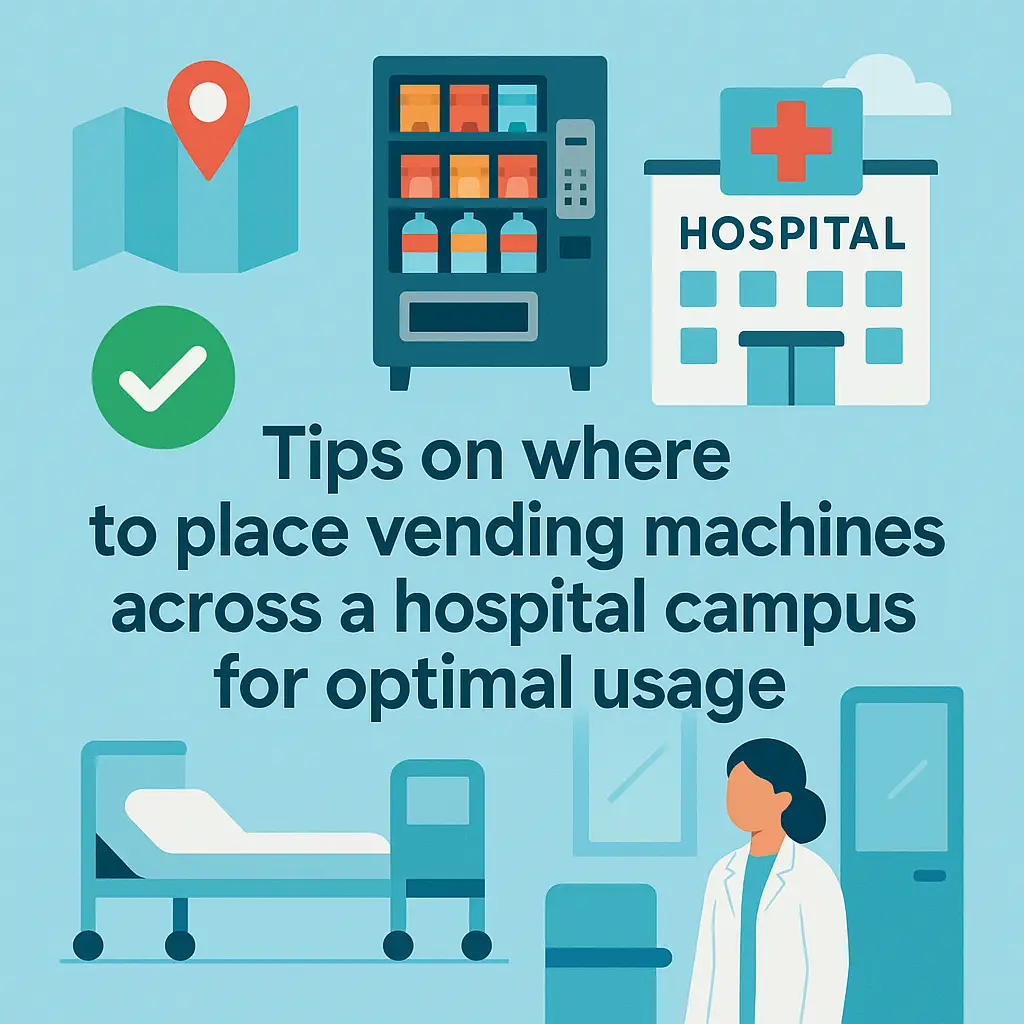Vending Machine Placement in Large Hospital Campuses
Tips on where to place vending machines across a hospital campus for optimal usage.
Back to Vending for Healthcare ResourcesTips on where to place vending machines across a hospital campus for optimal usage.
Back to Vending for Healthcare ResourcesMachines should be positioned in high-traffic areas like waiting rooms, staff lounges, and near main corridors to ensure easy access for all users.
![]() Strategic placement boosts accessibility for patients, staff, and visitors
Strategic placement boosts accessibility for patients, staff, and visitors
![]() High-traffic areas maximize machine visibility and consistent usage
High-traffic areas maximize machine visibility and consistent usage
![]() Balanced locations prevent overcrowding and improve service efficiency
Balanced locations prevent overcrowding and improve service efficiency

Placing vending machines across a large hospital campus requires thoughtful planning. With constant foot traffic from staff, patients, and visitors, strategic placement ensures accessibility and consistent usage. Choosing the right areas prevents machines from being overlooked or overcrowded, while also providing 24/7 convenience in critical zones.
Hospitals never sleep, and vending machines should reflect that reality. Locations like emergency department corridors, main lobbies, and waiting rooms are ideal spots. These areas experience steady flow, giving patients and families reliable access to food and drinks during long waits or late hours. By positioning machines here, hospitals support convenience without straining cafeteria operations.
Healthcare workers benefit from accessible vending during shifts that often extend beyond typical mealtimes. Machines placed in staff lounges, break areas, and near nursing stations ensure employees can grab quick meals or hydration without leaving their unit. This boosts efficiency and minimizes time away from patient care.
Hospitals often span multiple wings, clinics, and administrative spaces. Strategic placement in rehabilitation centers, outpatient clinics, and conference areas ensures vending supports all users. Placing machines in these less obvious spots prevents congestion in cafeterias and enhances the sense of accessibility across the entire campus.
Too many machines in one place can lead to wasted resources, while too few may cause lines and frustration. Spacing machines evenly across departments creates balance. Hospitals can also rotate or test machine placement over time to determine the most effective locations based on usage data.
Beyond convenience, accessibility standards must be met. Wheelchair-friendly designs and safe placement near wide corridors reduce barriers for patients and visitors. Machines should not block pathways or emergency exits, ensuring compliance with hospital safety standards.
For hospitals evaluating new vending strategies, reviewing how modern solutions can serve specialized needs is critical. Learn more about accessibility in wheelchair-accessible vending or explore how coffee availability supports staff and visitors during demanding hours.
If you're exploring vending options for your business, Vending Exchange can help simplify the process. Delivery, Installation and Equipment is provided at no cost to you - vendors provide the machines, keep them stocked, and handle all servicing. Whether you need a provider or full-service management, just fill out the form on this page to get started.
High-traffic zones like waiting areas, staff lounges, and main lobbies are best.
By choosing wide corridors and ADA-compliant models with reachable payment systems.
Outpatient clinics, rehab centers, and administrative buildings are frequently missed.
Yes, by providing 24/7 access in locations outside regular cafeteria hours.
It ensures quick meals and hydration during demanding shifts, improving efficiency.
It depends on campus size, traffic volume, and department needs—balance is key.
Machines must not block emergency exits and should meet safety standards.
Yes, usage data helps identify which areas need more or fewer machines.
They provide snacks and drinks when cafeterias are closed, especially at night.
Placing machines near therapy areas helps patients and families access hydration and snacks.